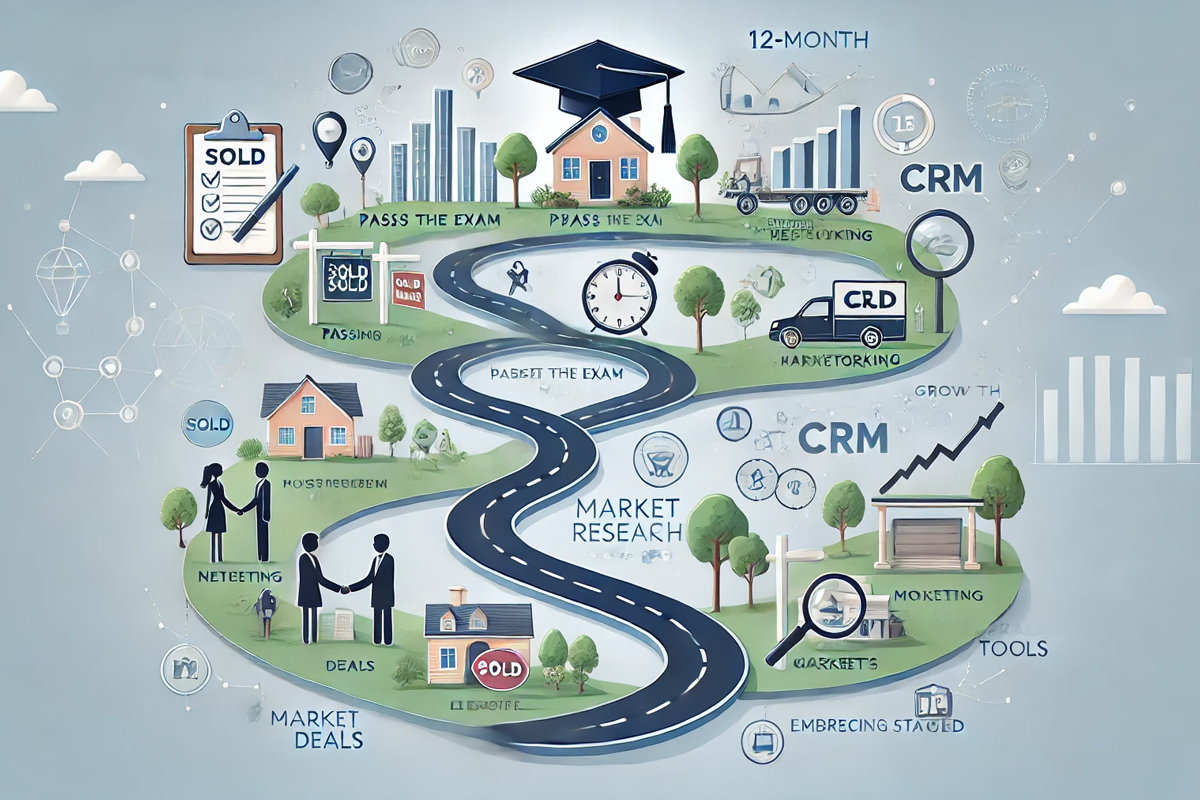
Embarking on a journey in the real estate industry doesn’t end once you’ve completed your real estate school courses and earned your license. Graduating from a reputable real estate school is the first step in establishing yourself as a successful, full-time professional. The path from the classroom to closing your first ten deals requires a clear vision, strategic planning, consistent learning, and a willingness to adapt to the evolving market.
This 12-month real estate career roadmap breaks down the steps you must take after finishing real estate license school— from fine-tuning your exam preparation and connecting with a brokerage to building a thriving client base and celebrating post-license success. By following this timeline, you’ll understand precisely what to do after real estate school, making it easier to transform your real estate license into a sustainable, flourishing career.
Focus: Exam Prep, Brokerage Research, Personal Branding
As soon as you’ve finished your real estate school coursework, it’s time to focus on passing the state exam. The sooner you conquer this hurdle, the quicker you can start working with clients. Don’t overlook exam prep; this step is critical to your post-license success. Revisit your course materials, utilize any available online practice exams, and engage with peers from your real estate school study groups.
Simultaneously, start researching brokerages in your area. Look for a company that aligns with your values, offers robust training, provides mentorship opportunities, and emphasizes ongoing development. The right brokerage can accelerate your success by supplying valuable resources and market insights. While you’re at it, begin building your brand. Claim social media handles, set up a professional website, and consider a logo that reflects your target audience and niche.
Focus: Licensing, Mentorship, Initial Marketing
By now, you should have passed your real estate exam. This is a significant achievement that transforms you from a real estate student into a licensed professional. Next, it’s time to finalize your association with a brokerage. Ideally, choose one known for its supportive culture, ongoing training, and history of nurturing new agents. A brokerage that offers a mentorship program is invaluable, as seasoned agents can guide you through the nuances of transactions, local regulations, and building client relationships.
Start marketing yourself to your sphere of influence—friends, family, and acquaintances. Share your new role, highlight your affiliation with a reputable brokerage, and position yourself as a reliable point of contact for buying, selling, and investing in real estate. This initial outreach establishes the foundation of your database and can lead to early referrals.
Focus: Local Market Research, Niche Specialization, Real Estate Tools
In the next couple of months, immerse yourself in your local market. Study neighborhood price trends, track recent sales, and learn to analyze the factors influencing property values. The more intimately you understand your territory, the easier it will be to advise clients, earn their trust, and negotiate favorable deals.
This period is also an excellent time to define your niche.
Consider what type of properties or clients you want to serve. You may excel working with first-time homebuyers, luxury listings, or investment properties. Specializing can help you stand out in a crowded field and streamline your marketing efforts, giving you a clear direction and focus in your career.
Invest in tools and software to boost efficiency—customer relationship management (CRM) platforms, digital marketing services, and transaction management systems. Mastering these tools not only helps you deliver a better client experience but also allows you to maintain an organized pipeline of leads, showings, and closings, empowering you to manage your business more efficiently.
Focus: Prospecting, Real Estate Networking, Community Engagement
At this stage, your primary aim is to ramp up lead generation. Prospecting doesn’t have to be daunting; it can be as simple as hosting open houses, attending local events, or joining networking groups for professionals in complementary industries (mortgage brokers, interior designers, or home inspectors). The relationships you build now will pay dividends down the line.
Leverage your brokerage’s marketing resources. Participate in workshops, webinars, and coaching sessions on lead-generation strategies. Consider optimizing your online presence by creating content that answers common client questions, such as “How to select the right property?”

Focus: Communication Skills, Negotiation, Client Referrals
By now, you’ve likely closed a few deals and gained experience working with different types of clients. Reflect on your successes and identify areas where you can improve. Consider enrolling in additional training or continuing education courses offered by your real estate school alumni network or professional associations. Improving your negotiation, presentation, and communication skills sets you apart from competitors who may rely solely on basic training.
Client satisfaction matters more than ever. Follow up with past clients for testimonials or referrals. Positive word-of-mouth can expand your client base without costly advertising. Personal touches—like a handwritten thank-you note after closing—reinforce your professionalism and dedication. These small gestures help foster long-term relationships that bring repeat business and consistent referrals, contributing to your post-license success.
Focus: Listing Presentations, Real Estate Marketing Strategy, Continuing Education
With nearly a year under your belt, it’s time to consider scaling your business. If you’ve been primarily representing buyers, start targeting more listings. Listings often create a multiplier effect: representing a seller can attract multiple buyers from a single property, boosting lead generation.
Refine your real estate marketing strategy to showcase your listings through professional photography, video tours, and social media promotions. Explore partnerships with local businesses, such as interior designers or moving companies, that can elevate your brand's visibility. Continuously invest in your education—take advanced real estate and marketing courses, attend industry seminars, and earn certifications that strengthen your credibility and skill set.
Focus: Review, Refine, Set New Goals
After 12 months in the industry, it’s time to review your progress. Have you reached your goal of closing your first ten deals? Reflect on what worked well and what could be improved. Review your lead sources—were some more fruitful than others? Did your brokerage relationship meet your expectations? Are you attracting the clients and listings you aimed for when you left real estate school?
Use this analysis to set new, more ambitious goals for the following year. Perhaps you’ll double your transaction volume, earn a specialized certification, or expand your team. The key is to remain adaptable and committed to ongoing growth. Real estate is dynamic, and professionals who embrace change are best positioned to thrive.
From Classroom to Closing: A Sustainable Real Estate Career
Completing real estate school and earning your license is only the beginning of a long, rewarding journey. Following this 12-month real estate career roadmap, you’ve learned precisely what to do after real estate school to transition smoothly from a new licensee into a confident, skilled agent who can handle any market challenge.
From acing your exam and choosing a supportive brokerage to mastering local market knowledge, boosting lead generation, and refining your negotiation skills, each step moves you closer to post-license success. Embrace continuous learning, prioritize client relationships, and keep a finger on the industry’s pulse. With dedication, strategy, and resilience, you can turn your initial investment in real estate school into a thriving career that lasts for years.
Love,
Kartik
Common Mistakes Applicants Make on DRE Forms
How Important Are Online Reviews for Real Estate Schools?
How to Apply for Your California Real Estate License After Passing the Exam

Founder, Adhi Schools
Kartik Subramaniam is the Founder and CEO of ADHI Real Estate Schools, a leader in real estate education throughout California. Holding a degree from Cal Poly University, Subramaniam brings a wealth of experience in real estate sales, property management, and investment transactions. He is the author of nine books on real estate and countless real estate articles. With a track record of successfully completing hundreds of real estate transactions, he has equipped countless professionals to thrive in the industry.